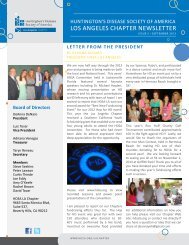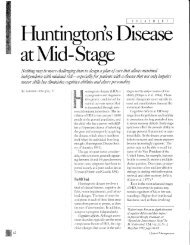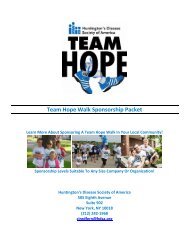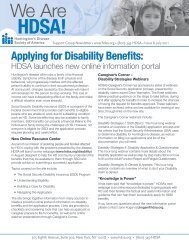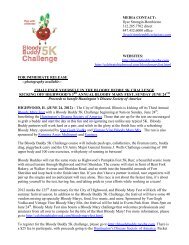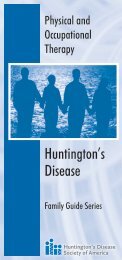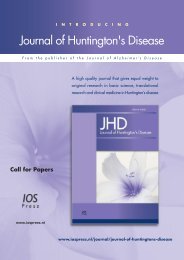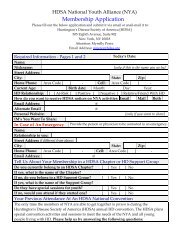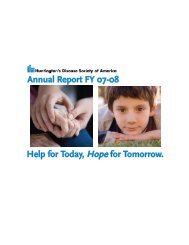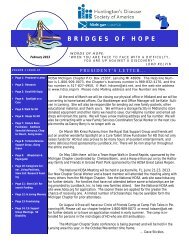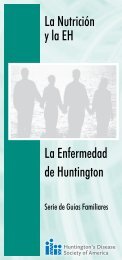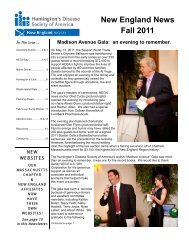Understanding Behavior in HD.final.8-18-05 - Huntington's Disease ...
Understanding Behavior in HD.final.8-18-05 - Huntington's Disease ...
Understanding Behavior in HD.final.8-18-05 - Huntington's Disease ...
You also want an ePaper? Increase the reach of your titles
YUMPU automatically turns print PDFs into web optimized ePapers that Google loves.
31<br />
• The environment should be as calm and structured as possible. People with <strong>HD</strong> tend to become mentally<br />
<strong>in</strong>flexible and are typically comforted by stability. Establish daily rout<strong>in</strong>es and break them as <strong>in</strong>frequently<br />
as possible.<br />
• There are medications that can control irritability. It is important to see a physician who has current<br />
knowledge of Hunt<strong>in</strong>gton’s <strong>Disease</strong>.<br />
• <strong>HD</strong> <strong>in</strong> itself does not cause an <strong>in</strong>dividual to become dangerous but a loss of normal regulation of impulses<br />
can contribute to unsafe situations. Family members should be responsible for provid<strong>in</strong>g a safe<br />
environment so that no person is ever <strong>in</strong> danger. Remove potential weapons from the house and have<br />
emergency numbers near the telephone.<br />
DENIAL AND UNAWARENESS<br />
DEFINITION<br />
Denial <strong>in</strong> an <strong>in</strong>dividual with <strong>HD</strong> is common. There are at least two reasons why denial can occur.<br />
Commonly, denial is considered a psychological <strong>in</strong>ability to cope with distress<strong>in</strong>g circumstances. We often see<br />
this type of denial <strong>in</strong> cases such as loss of a loved one (denial that they are gone), term<strong>in</strong>al disease (denial of<br />
cancer or <strong>HD</strong> diagnosis), serious illness, or <strong>in</strong>jury . This type of denial, however, typically decreases over time as<br />
the <strong>in</strong>dividual beg<strong>in</strong>s to “face reality.” In contrast, <strong>in</strong>dividuals with <strong>HD</strong> often suffer from a lack of <strong>in</strong>sight or<br />
self-awareness. They are unable to recognize their own disabilities and are unable to evaluate their own<br />
behavior. This type of denial is sometimes called organic denial and is a condition that may last a lifetime.<br />
Given that we typically assume that denial is under the control of the <strong>in</strong>dividual, the term may not be useful<br />
for persons with <strong>HD</strong> suffer<strong>in</strong>g from this organic type of denial. Therefore, we recommend that “unawareness”<br />
be used to describe this behavior <strong>in</strong> <strong>HD</strong>.<br />
Unawareness often plays a significant role <strong>in</strong> difficult and seem<strong>in</strong>gly irrational behavior. On one hand,<br />
unawareness is beneficial because it keeps <strong>in</strong>dividuals motivated to try th<strong>in</strong>gs and to avoid labell<strong>in</strong>g themselves<br />
as “affected” or “impaired.” Unawareness can also be a useful defense mechanism aga<strong>in</strong>st depression. On the<br />
other hand, anger may develop from unawareness because <strong>in</strong>dividuals with <strong>HD</strong> cannot understand why they<br />
cannot go back to work or live <strong>in</strong>dependently. <strong>HD</strong> persons with unawareness sometimes feel that people are<br />
unjustifiably keep<strong>in</strong>g them away from activities that they could do (e.g., driv<strong>in</strong>g, work<strong>in</strong>g, car<strong>in</strong>g for children).<br />
You may hear an <strong>in</strong>dividual with <strong>HD</strong> enumerate a long list of people who are at fault for his or her failure to<br />
return to work, to drive, to travel or to live alone.<br />
This type of unawareness can become dangerous if the <strong>in</strong>dividual with <strong>HD</strong> (and unawareness) attempts to<br />
do th<strong>in</strong>gs <strong>in</strong>dependently that are not safe. Often, these <strong>in</strong>dividuals are considered to have poor judgement.<br />
Judgement is impaired, <strong>in</strong> this case, because of the unawareness of limitations that <strong>HD</strong> can create.<br />
Unawareness is not only a problem for the <strong>in</strong>dividual with <strong>HD</strong>, but also for health professionals, friends<br />
and family members. There are some family members and/or health professionals who delay mak<strong>in</strong>g the



